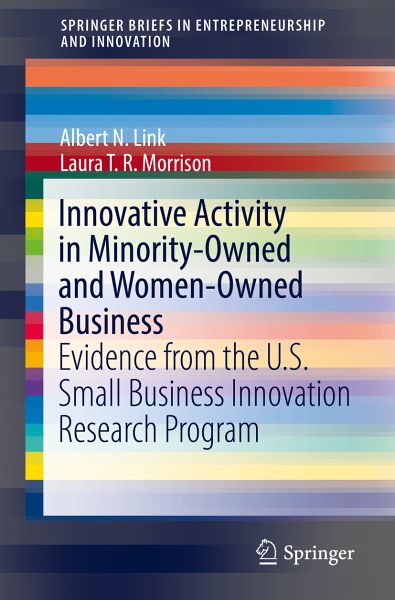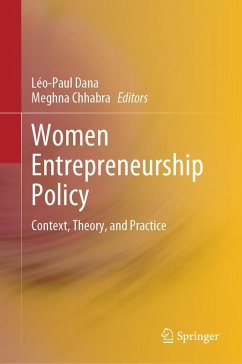
Innovative Activity in Minority-Owned and Women-Owned Business (eBook, PDF)
Evidence from the U.S. Small Business Innovation Research Program
Versandkostenfrei!
Sofort per Download lieferbar
40,95 €
inkl. MwSt.
Weitere Ausgaben:

PAYBACK Punkte
20 °P sammeln!
This volume examines the involvement of minority- or women-owned businesses in technology-based research, with particular focus on the differences in research outcomes in achieving commercialization. Specifically, the authors empirically investigate the correlation between technologies from projects funded through the Phase II Small Business Innovation Research (SBIR) program and the minority or gender demographics of the owners of the businesses conducting the research. This study offers an opportunity to not only examine public-sector agencies' investments in research, but also to investigat...
This volume examines the involvement of minority- or women-owned businesses in technology-based research, with particular focus on the differences in research outcomes in achieving commercialization. Specifically, the authors empirically investigate the correlation between technologies from projects funded through the Phase II Small Business Innovation Research (SBIR) program and the minority or gender demographics of the owners of the businesses conducting the research. This study offers an opportunity to not only examine public-sector agencies' investments in research, but also to investigate if there are race and/or gender gaps in such business' participation in innovative activities. It also provides a means to understand innovation by minorities and women in the entrepreneurial ecosystem.
Investments in fundamental science and technology research and investments in human capital through science, technology, engineering, and mathematics (STEM) education areimportant building blocks of innovation. Two methods of fueling innovation are to 1) accelerate the commercialization of federally funded research and 2) ensure opportunities for underrepresented minorities and women in the entrepreneurial ecosystem. Despite this understanding, there is still a disparity in the rates of educated men and women in STEM fields participating in entrepreneurship. Moreover, the link between underrepresentation of minorities and women across STEM fields correlates with entrepreneurial entry and performance. This book expands on these findings and estimates the probability that (1) a funded research project reaches completion, (2) the developed technology is commercialized, and finally (3) the commercialized technology is successful in the marketplace (i.e., the business gained revenue and market share from the technology).
Dieser Download kann aus rechtlichen Gründen nur mit Rechnungsadresse in A, B, BG, CY, CZ, D, DK, EW, E, FIN, F, GR, HR, H, IRL, I, LT, L, LR, M, NL, PL, P, R, S, SLO, SK ausgeliefert werden.












